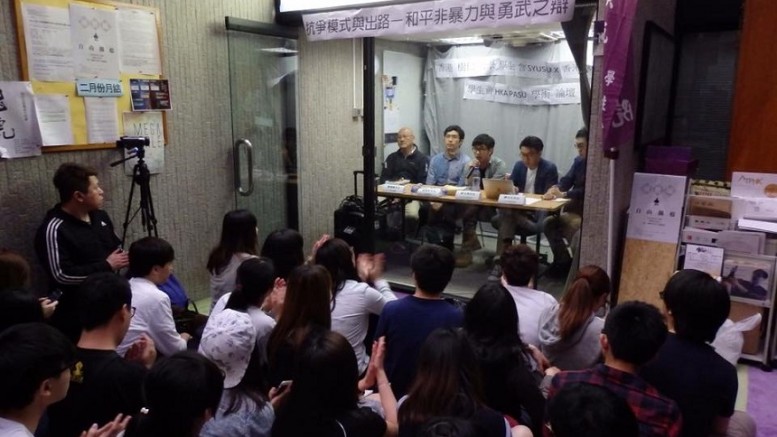By Chris Yeung –
Dubbed as a “pseudo-issue,” “non-issue,” the Government is now taking seriously the issue of calls for Hong Kong independence after the mainland authorities and local loyalists stepped up attack against what some branded as separatism.
Justice minister Rimsky Yuen Kwok-keung revealed on Saturday he has asked law enforcement agencies to conduct investigations into the activities of pro-independence groups in four aspects. Specifically, he wants advice on whether those groups have violated companies ordinance, societies ordinance, criminal and other related criminal ordinances.
“Advocating for independence of Hong Kong is totally contrary to the Basic Law and also contrary to the legal status of Hong Kong,” he said, adding the government would handle the matter seriously.
Yuen hardened his stance on pro-independence activities on the same day the official People’s Daily’s overseas edition urged the government not to tolerate pro-independence advocacy in a column.
It said: “The Secretary of Justice needs to study in detail whether to take legal action.
“Some people only want to stand out to attract media attention in order to enhance their reputation. But [their actions] have pushed Hong Kong to a dangerous place. The SAR government can no longer be lenient.”
The article accused radical parties of proposing “armed revolution” while spreading pro-independence ideology on campuses through discussion forums and reading groups.
Citing a recent survey conducted among students at the Chinese University of Hong Kong, it said 70 per cent of respondents supported “peaceful, rational and non-violent” approach in political campaign.
The People’s Daily article was published days after Wang Zhenmin, head of the legal affairs department at the central government’s Liaison Office in Hong Kong, told a Foreign Correspondence Club lunch extensive talk about Hong Kong independence might have already breached the incitement offence under the present crimes ordinance.
While officials were dropping hints of legal action against the alleged unlawful pro-independence activities, pro-establishment figures have mounted an propaganda offensive against the separatist trend.
At a talk hosted by the Hong Kong Development Forum last week, speakers have branded localism advocates as separatist and that those who call for self-determination by Hong Kong people for their future after 2047 were also separatist in disguise.
Prominent economist Francis Lui Ting-ming, one of the speakers, has warned of catastrophic economic consequences for Hong Kong if the city declared independence. Hong Kong would finish after the central government cut off economic ties with the city, he said.
They called on people to speak up to help stop the trend of pro-independence campaign.
Some legal experts, including University of Hong Kong law professor Johannes Chan Man-mun, have maintained mere talk about Hong Kong independence did not constitute an offence under existing laws. Any amendments to crime laws that could restrict freedom of expression on matters such as independence might violate bill of rights ordinance, he said.
It is obviously clear the row over independence is primarily a political issue. But for the government to act, they need to establish a case in law for them to prohibit those activities.
Whether there is a legal case remains to be seen. But by hinting at legal action, the government is eagerly keen to send a clear message to Beijing and the local populace they will not tolerate even talk about independence.
But by doing so, the debate about independence will become even more controversial. Curbs on freedom of expression will stoke fears of threat to the city’s core values, prompting a stronger defence by the people for their right to speak aloud on an issue Beijing does not want any public talk at all.
Chris Yeung is founder and editor of the Voice of Hong Kong website. He is a veteran journalist formerly worked with the South China Morning Post and the Hong Kong Economic Journal. He writes on Greater China issues.
Photo: Picture taken from Hong Kong National Party Facebook


Be the first to comment on "Get real with ‘pseudo’ independence issue"